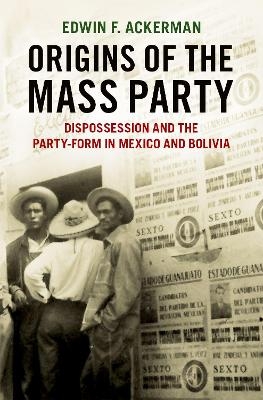
Origins of the Mass Party
Oxford University Press Inc (Verlag)
978-0-19-757650-2 (ISBN)
In Mexico (1921) and Bolivia (1952), nationalist insurrections with armies largely composed of peasants triumphed over oligarchical regimes. In the aftermath of these uprisings, parties led by members of an urban middle-class intelligentsia adopting a populist agrarian discourse attempted to incorporate this predominantly peasant base. The outcomes of these efforts were, however, radically different.
In Origins of the Mass Party, Edwin F. Ackerman tells the stories of the Partido Revolucionario Institucional (PRI) as a mass party in post-revolutionary Mexico (1929-1946), and the attempt but ultimate failure of Bolivia's Movimiento Nacionalista Revolucionario (MNR) (1953-1964) to do the same. As he shows, Mexico's PRI successfully mobilized peasants into party politics, translating the insurrectionary effervescence of the peasantry into organizational incorporation. Bolivia's MNR, in contrast, attempted but failed to undertake a homologous process. To shed light on why this happened, Ackerman examines the historical conditions necessary for the emergence of the mass political parties, offering insights into the persistence of parties over time by linking the economic dispossession that makes it possible to articulate individuals into a political bloc, and the political dispossession that produces professional politicians to undertake articulation and create constituencies. He argues that parties are the predominant form of political mobilization at a global scale, even in an age of dissatisfaction with conventional organization and persistent experimentation with new forms of association.
Both comparative and historical in scope, Origins of the Mass Party seeks to show why there is such a strong bond between the party-form and the contemporary world by highlighting the connection between capitalism, modern-state formation, and the party-form.
Edwin F. Ackerman is Assistant Professor of Sociology at the Maxwell School of Citizenship and Public Affairs at Syracuse University. His academic work has been published in Social Science History, Ethnic and Racial Studies, the Journal of Language and Politics, Contexts, and NACLA Report on the Americas, among other venues, and has been featured in National Public Radio (NPR), among other media outlets. He is a Ford Fellow and American Sociological Association Minority Fellowship Program recipient, and was a Global History Fellow at Harvard's Weatherhead Center (18'-19'). He received a PhD in sociology from UC Berkeley.
Acknowledgements
Introduction
Part I
Chapter 1: Mexico and Bolivia in Comparative Perspective and the Sociology of Party Formation
Chapter 2: Dispossession and the Mass Party
Part II
Chapter 3: The Emergence of the PRI in Mexico
Chapter 4: The Failure of Party Formation in Bolivia
Part III
Chapter 5: Dispossession and Party Formation in Broader Comparative Perspective: Germany's SPD and the (Absent) British Labour Party
Conclusion
Appendix
Index
| Erscheinungsdatum | 17.11.2021 |
|---|---|
| Zusatzinfo | 5 b/w figures; 3 tables |
| Verlagsort | New York |
| Sprache | englisch |
| Maße | 160 x 246 mm |
| Gewicht | 431 g |
| Themenwelt | Geisteswissenschaften ► Religion / Theologie |
| Sozialwissenschaften ► Politik / Verwaltung ► Politische Systeme | |
| Sozialwissenschaften ► Politik / Verwaltung ► Staat / Verwaltung | |
| ISBN-10 | 0-19-757650-8 / 0197576508 |
| ISBN-13 | 978-0-19-757650-2 / 9780197576502 |
| Zustand | Neuware |
| Haben Sie eine Frage zum Produkt? |
aus dem Bereich


